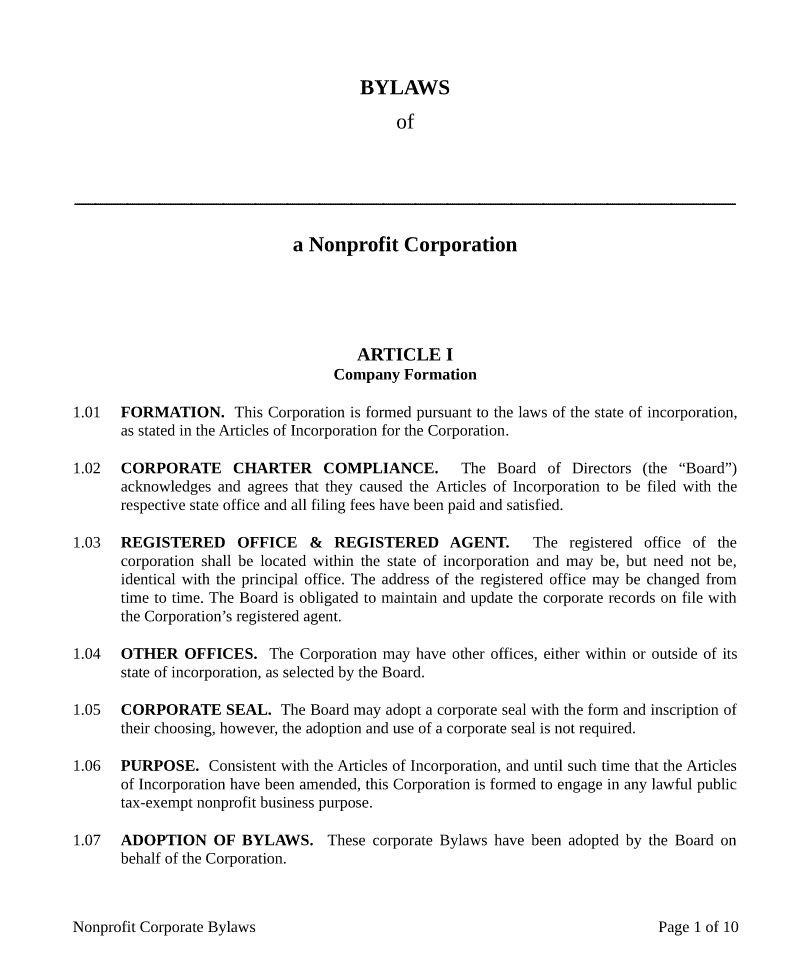Nonprofit Bylaws
Nonprofit bylaws are the rules that govern how your nonprofit will make decisions. Procedures for routine tasks (like voting and record-keeping) along with unusual ones (like handling emergencies or conflicts of interest) are defined in your bylaws. You’ll need nonprofit bylaws to resolve disputes and guard against legal trouble. Third parties like banks, potential donors and the IRS will likely request to review your bylaws.
Adopting bylaws is one of the first steps your nonprofit should take. Our nonprofit bylaws template was written by attorneys for use in any state. You can use it to get your nonprofit started.
What to Include in Nonprofit Bylaws
Your nonprofit bylaws should include basic information about your nonprofit, like its name, registered agent’s address, and purpose. Once that’s covered, your nonprofit bylaws should address the following topics:
- Board of Directors. Your nonprofit bylaws should define how many directors will make up your board, the length of their terms, and what their responsibilities and powers are. There should also be rules in place for adding, removing, and compensating directors.
- Meetings. Details on how you’ll give notice for and hold board meetings should be included. You’ll also want to define your nonprofit’s quorum (the minimum number of directors required to be present to hold a legitimate meeting).
- Officers. Your bylaws should clearly establish the responsibilities of each officer. Policies for adding, removing, and compensating your officers should be covered here as well.
- Record-keeping. You’ll want to include rules for how your nonprofit will keep track of meeting minutes, accounting records, the contact information for your board and officers, and other important documentation.
- Mergers and Dissolution. You may not be thinking about merging or dissolving your nonprofit at this point, but you need a plan for both scenarios.
- Amendments. It’s important to include rules for changing your bylaws and adopting emergency bylaws.
Need to back up a little? Learn how to start a nonprofit with our Nonprofit Guide.
Why Nonprofit Bylaws Are Important
In most states, nonprofit bylaws are legally required. But adopting bylaws isn’t just a box your nonprofit needs to check. You’ll need bylaws for several reasons.
Bylaws are necessary for opening a business bank account.
Your nonprofit is a separate legal entity from its owners. As long as you maintain this separation, your nonprofit will have its own liability and assets, and your personal finances are shielded from business debts. Mixing personal spending and your nonprofit’s spending erodes this separation and puts your liability protection at risk. For this reason, it’s crucial that you open a business bank account for your nonprofit. And when you go to the bank to do so, it’s likely that they’ll ask to see your Articles of Incorporation, your EIN, and—you guessed it—your nonprofit bylaws.
Bylaws guard against outside legal involvement.
No matter how much you like your business partners, disagreements are inevitable. Without bylaws, it’s much more difficult to resolve a dispute, and your nonprofit could find itself requiring the state to step in and decide whether the actions it took were legal. Strong bylaws guard against this possibility and make it easier for you to retain control over your nonprofit.
Bylaws may help your nonprofit qualify for 501(c)(3) tax-exempt status.
Most nonprofits that apply for tax-exempt status under Code 501(c)(3) do so by filing Form 1023 with the IRS. The IRS requests that, “if adopted,” you attach your bylaws to this form. If you haven’t adopted bylaws by the time you apply, you can technically apply without them. However, the IRS is going to take a close look at your nonprofit, so you’ll want to make sure your documents are buttoned up.
For more on applying for tax-exempt status, see our 501(c)(3) Guide.
Nonprofit Bylaws FAQ
It depends. You don’t have to file nonprofit bylaws with your local Secretary of State when you incorporate. However, if you plan to apply for tax-exempt status from the IRS under Code 501(c)(3), you’ll be asked to attach your bylaws to the application. The IRS will then make your application—and the attached bylaws—public.
No. Technically, your nonprofit’s board of directors could adopt bylaws without signing them. But any lawyer worth her salt would recommend that you get signatures. Doing so shows that your nonprofit is in agreement.
There’s no legally required format that nonprofit bylaws must follow. Many bylaws divide up the topics they cover into sections and include the basic information about the nonprofit (like its name, address, and registered agent) early in the document. For an example, see our nonprofit bylaws template above.
You’ll find plenty of free nonprofit bylaws templates littered across the wilderness of the internet. But who wrote them? And when were they last reviewed? Chances are, no one remembers. Plenty of the bylaws templates you’ll find online have been recycled and reused.
Our nonprofit bylaws template was drafted by our in-house attorneys. Of course, your finished bylaws should be customized to suit the needs of your nonprofit—but a recently drafted, trustworthy template is a great place to start.
